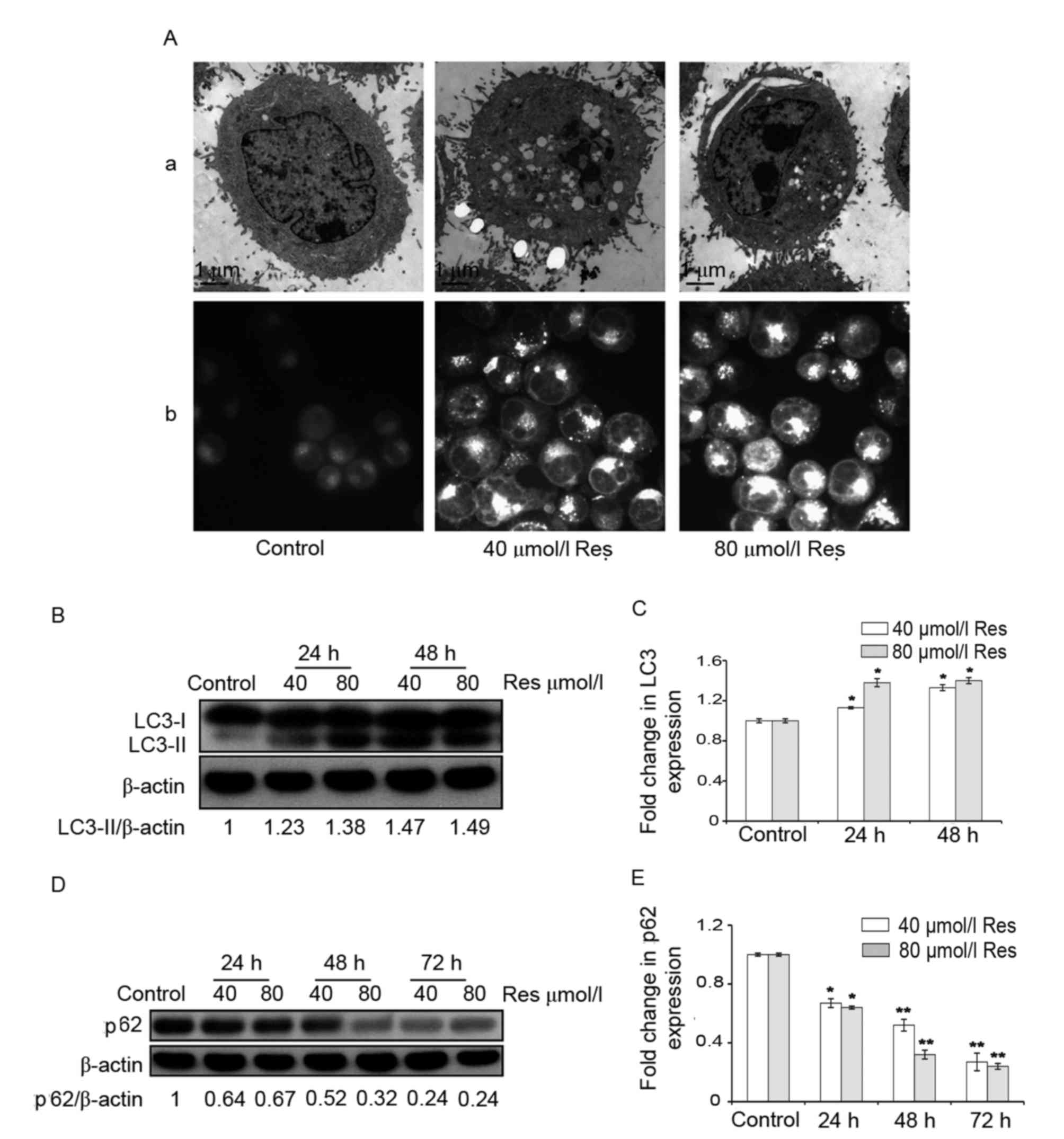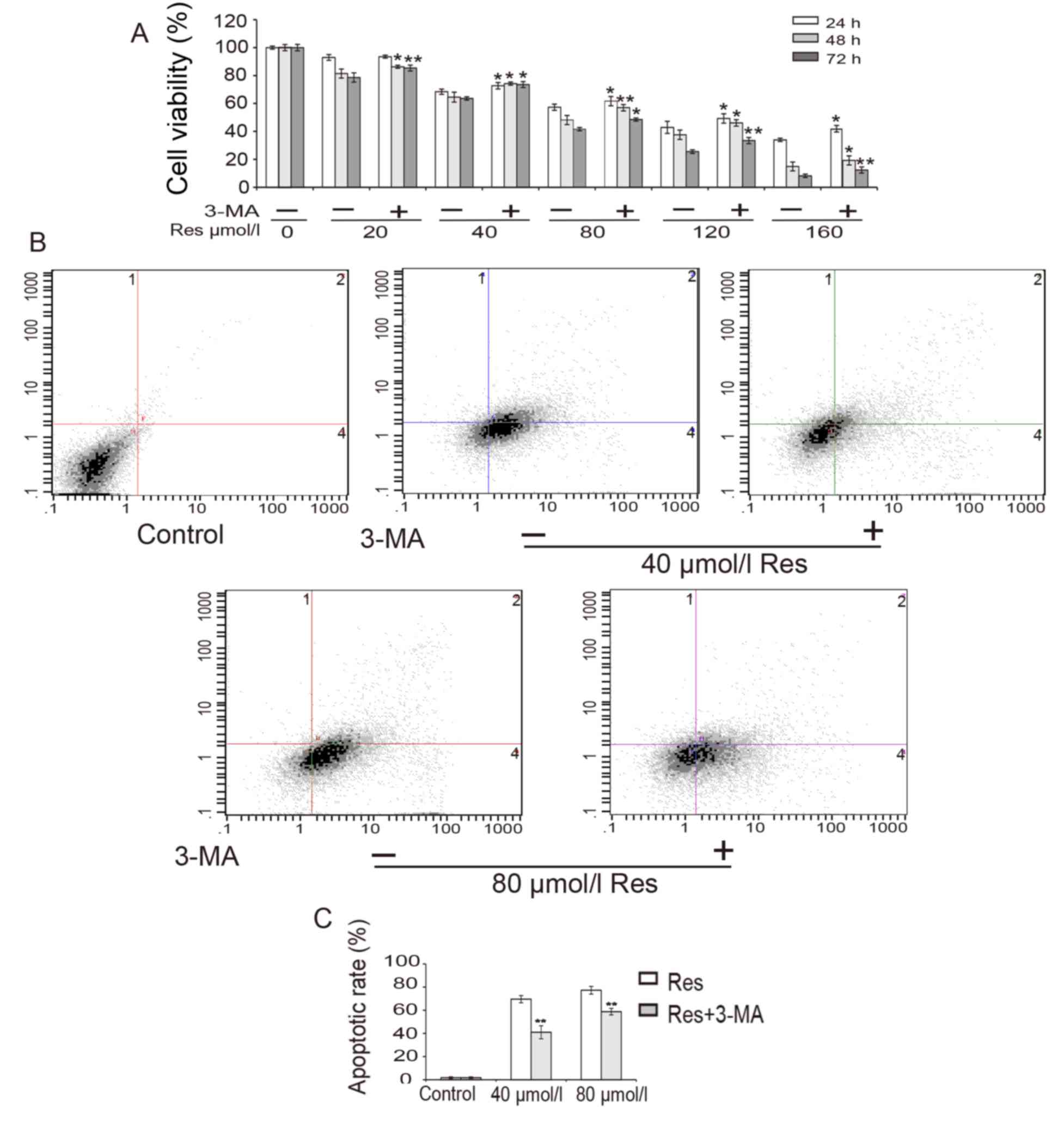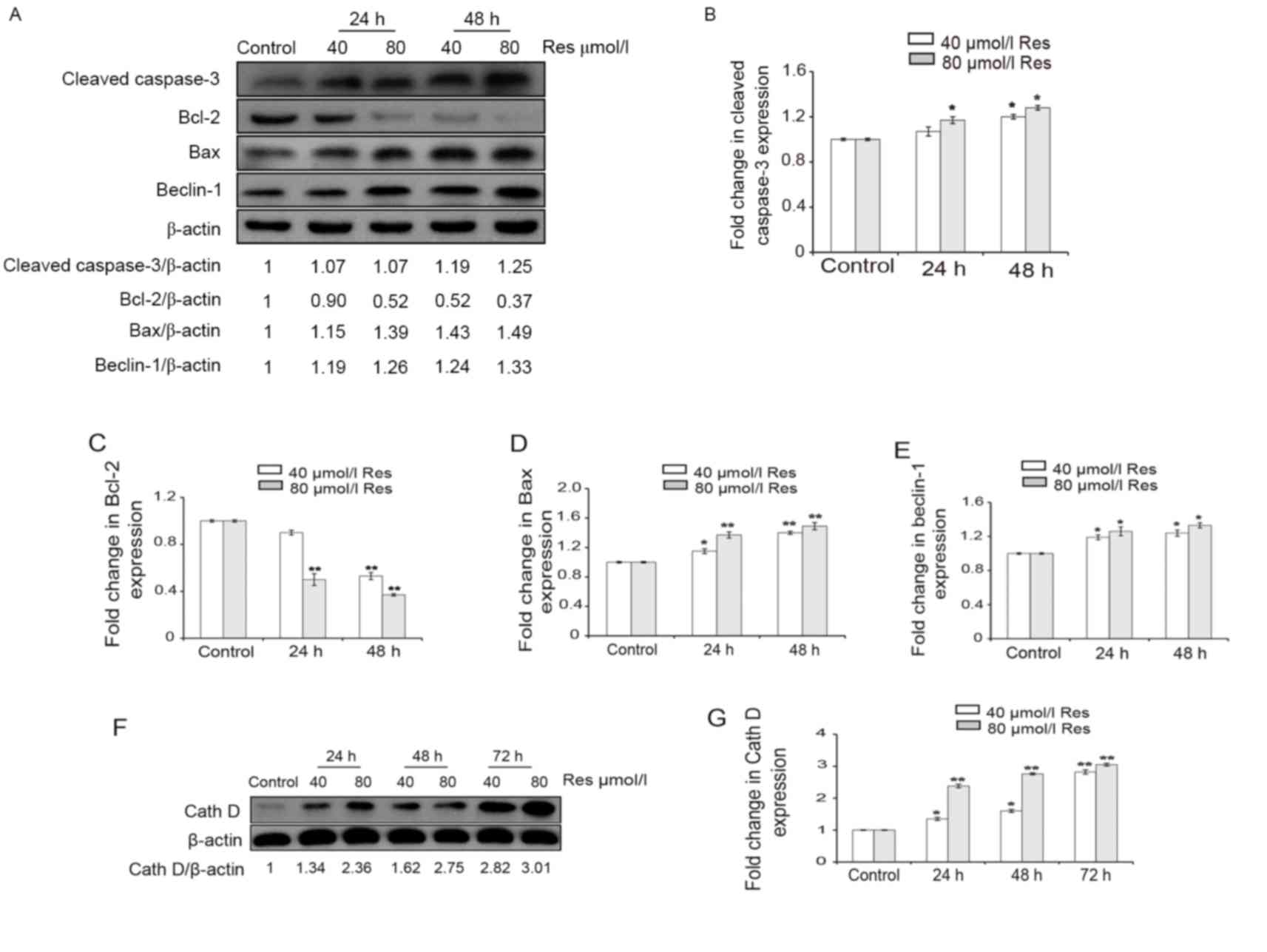|
1
|
Eum KH and Lee M: Targeting the autophagy
pathway using ectopic expression of Beclin1 in combination with
rapamycin in drug-resistant v-Ha-ras-transformed NIH 3T3 cells. Mol
Cells. 31:231–238. 2011. View Article : Google Scholar : PubMed/NCBI
|
|
2
|
Lin CJ, Lee CC, Shih YL, Lin TY, Wang SH,
Lin YF and Shih CM: Resveratrol enhances the therapeutic effect of
temozolomide against malignant glioma in vitro and in vivo by
inhibiting autophagy. Free Radic Biol Med. 52:377–379. 2012.
View Article : Google Scholar : PubMed/NCBI
|
|
3
|
Burada F, Nicoli ER, Ciurea ME, Uscatu DC,
Ioana M and Gheonea DI: Autophagy in colorectal cancer: An
important switch from physiology to pathology. World J Gastrointest
Oncol. 7:271–284. 2015. View Article : Google Scholar : PubMed/NCBI
|
|
4
|
Chen J, Wei HL, Chen J and Xie B:
Antitumor effect of arsenic trioxide in human K562 and K562 ADM
cells by autophagy. Toxicol Mech Methods. 22:512–519. 2012.
View Article : Google Scholar : PubMed/NCBI
|
|
5
|
Shuhua W, Chenbo S, Yangyang L, Xiangqian
G, Shuang H, Tangyue L and Dong T: Autophagy-related genes raptor,
rictor and beclin 1 expression and relationship with multidrug
resistance in colorectal carcinoma. Hum Pathol. 46:1752–1759. 2015.
View Article : Google Scholar : PubMed/NCBI
|
|
6
|
Panda PK, Mukhopadhyay S, Das DN, Sinha N,
Naik PP and Bhutia SK: Mechanism of autophagic regulation in
carcinogenesis and cancer therapeutics. Semin Cell Dev Biol.
39:43–55. 2015. View Article : Google Scholar : PubMed/NCBI
|
|
7
|
Galluzzi L, Pietrocola F, Bravo-San Pedro
JM, Amaravadi RK, Baehrecke EH, Cecconi F, Codogno P, Debnath J,
Gewirtz DA, Karantza V, et al: Autophagy in malignant
transformation and cancer progression. EMBO J. 34:856–880. 2015.
View Article : Google Scholar : PubMed/NCBI
|
|
8
|
Zhao XY, Li GY, Liu Y, Chai LM, Chen JX,
Zhang Y, Du ZM, Lu YJ and Yang BF: Resveratrol protects against
arsenic trioxide-induced cardiotoxicity in vitro and in vivo. Br J
Pharmacol. 154:105–113. 2008. View Article : Google Scholar : PubMed/NCBI
|
|
9
|
Barjot C, Tournaire M, Castagnino C, Vigor
C, Vercauteren J and Rossi JF: Evaluation of antitumor effects of
two vine stalk oligomers of resveratrol on a panel of lymphoid and
myeloid cell lines: Comparison with resveratrol. Life Sci.
81:1565–1574. 2007. View Article : Google Scholar : PubMed/NCBI
|
|
10
|
Yan HW, Hu WX, Zhang JY, Wang Y, Xia K,
Peng MY and Liu J: Resveratrol induces human K562 cell apoptosis,
erythroid differentiation and autophagy. Tumour Biol. 35:5381–5388.
2014. View Article : Google Scholar : PubMed/NCBI
|
|
11
|
Naponelli V, Modernelli A, Bettuzzi S and
Rizzi F: Roles of autophagy induced by natural compounds in
prostate cancer. Biomed Res Int. 2015:1218262015. View Article : Google Scholar : PubMed/NCBI
|
|
12
|
Fang Y, DeMarco VG and Nicholl MB:
Resveratrol enhances radiation sensitivity in prostate cancer by
inhibiting cell proliferation and promoting cell senescence and
apoptosis. Cancer Sci. 103:1090–1098. 2012. View Article : Google Scholar : PubMed/NCBI
|
|
13
|
Fang Y, Bradley MJ, Cook KM, Herrick EJ
and Nicholl MB: A potential role for resveratrol as a radiation
sensitizer for melanoma treatment. J Surg Res. 183:645–653. 2013.
View Article : Google Scholar : PubMed/NCBI
|
|
14
|
Pattingre S, Tassa A, Qu X, Garuti R,
Liang XH, Mizushima N, Packer M, Schneider MD and Levine B: Bcl-2
antiapoptotic proteins inhibits Beclin1-dependent autophagy. Cell.
122:927–939. 2005. View Article : Google Scholar : PubMed/NCBI
|
|
15
|
Chen J, Chen J, Xie B and Wei HL: Acquired
multidrug resistance in human K562/ADM cells is associated with
enhanced autophagy. Toxicol Mech Methods. 23:678–683. 2013.
View Article : Google Scholar : PubMed/NCBI
|
|
16
|
Yang J and Yao S: JNK-Bcl-xL-Bax/Bak
pathway mediates the crosstalk between matrine-induced autophagy
and apoptosis via interplay with Beclin1. Int J Mol Sci.
16:25744–25758. 2015. View Article : Google Scholar : PubMed/NCBI
|
|
17
|
Trincheri NF, Nicotra G, Follo C, Castino
R and Isidoro C: Resveratrol induces cell in colorectal cancer
cells by a novel pathway involving lysosomal cathepsin D.
Carcinogenesis. 28:922–931. 2007. View Article : Google Scholar : PubMed/NCBI
|
|
18
|
Hsu KF, Wu CL, Huang SC, Wu CM, Hsiao JR,
Yo YT, Chen YH, Shiau AL and Chou CY: Cathepsin L mediates
resveratrol-induced autophagy and apoptotic cell death in cervical
cancer cells. Autophagy. 5:451–460. 2009. View Article : Google Scholar : PubMed/NCBI
|
|
19
|
Jang BG, Choi BY, Kim JK, Kim MJ, Sohn M
and Suh SW: Impairment of autophagic flux promotes glucose
reperfusion-induced neuro2A cell death after glucose deprivation.
PloS One. 8:e764662013. View Article : Google Scholar : PubMed/NCBI
|
|
20
|
Zhang J, Ma K, Qi T, Zhang Q, Li G and
Chiu JF: P62 regulates resveratrol-mediated Fas/Cav-1 complex
formation and transition from autophagy to apoptosis. Oncotarget.
6:789–801. 2015.PubMed/NCBI
|
|
21
|
Zhang X, Xu W, Su J, Chu M, Jin H, Li G,
Tan C, Wang X and Wang C: The prosurvival role of autophagy in
resveratrol-induced cytotoxicity in GH3 cells. Int J Mol Med.
33:987–993. 2014. View Article : Google Scholar : PubMed/NCBI
|
|
22
|
Bhardwaj A, Sehthi G, Vadhan-Raj S,
Bueso-Ramos C, Takada Y, Gaur U, Nair AS, Shishodia S and Aggarwal
BB: Resveratrol inhibits proliferation, induces apoptosis and
overcomes chemoresistance through down-regulation of STAT3 and
nuclear factor-kappaB-regulated antiapoptotic and cell survival
gene products in human multiple myeloma cell. Blood. 109:2293–2302.
2007. View Article : Google Scholar : PubMed/NCBI
|
|
23
|
Liu YN, Wang YX, Liu XF, Jiang LP, Yang G,
Sun XC, Geng CY, Li QJ, Chen M and Yao XF: Citreoviridin induces
ROS-dependent autophagic cell death in human liver HepG2 cells.
Toxicon. 95:30–37. 2015. View Article : Google Scholar : PubMed/NCBI
|
|
24
|
Chen QY, Shi JG, Yao QH, Jiao DM, Wang YY,
Hu HZ, Wu YQ, Song J, Yan J and Wu LJ: Lysosomal member
permeabilization is involved in curcumin-induced apoptosis of A549
lung carcinoma cells. Mol Cell Biochem. 359:389–398. 2012.
View Article : Google Scholar : PubMed/NCBI
|
|
25
|
Prabhu V, Srivastava P, Yadav N, Amadori
M, Schneider A, Seshadri A, Pitarresi J, Scott R, Zhang H,
Koochekpour S, et al: Resveratrol depletes mitochondrial DNA and
inhibition of autophagy enhances resveratrol-induced caspase
activation. Mitochondrion. 13:493–499. 2013. View Article : Google Scholar : PubMed/NCBI
|
|
26
|
Yelamanchili SV, Chaudhuri AD, Flynn CT
and Fox HS: Upregulation of cathepsin D in the caudate nucleus of
primates with experimental parkinsonism. Mol Neurodegener.
6:522011. View Article : Google Scholar : PubMed/NCBI
|
|
27
|
Wei MF, Chen MW, Chen KC, Lou PJ, Lin SY,
Hung SC, Hsiao M, Yao CJ and Shieh MJ: Autophagy promotes
resistance to photodynamic therapy-induced apoptosis selectively in
colorectal cancer stem-like cells. Autophagy. 10:1179–1192. 2014.
View Article : Google Scholar : PubMed/NCBI
|
|
28
|
Kim DH, Lee NY, Sung WJ, Baek JH, Kim JG,
Sohn SK, Suh JS, Lee KS and Lee KB: Multidrug resistance as a
potential prognostic indicator in acute myeloid leukemia with
normal karyotype. Acta Haematol. 114:78–83. 2005. View Article : Google Scholar : PubMed/NCBI
|
|
29
|
Xu N, Zhang J, Shen C, Xia L, Xue F and
Xia Q: Cisplatin-induced down regulation of mir-199a-5p increases
drug resistance by activating autophagy in HCC cell. Biochem
Biophys Res Cimmun. 423:826–831. 2012. View Article : Google Scholar
|
|
30
|
Xue C, Wang C, Liu Q, Meng Q, Sun H, Huo
X, Ma X, Liu Z, Ma X, Peng J and Liu K: Targeting P-glycoprotein
expression and cancer cell energy metabolism: Combination of
metformin and 2-deoxyglucose reverses the multidrug resistance of
K562/Dox cells to doxorubicin. Tumor Biol. 37:8587–8597. 2016.
View Article : Google Scholar
|

















